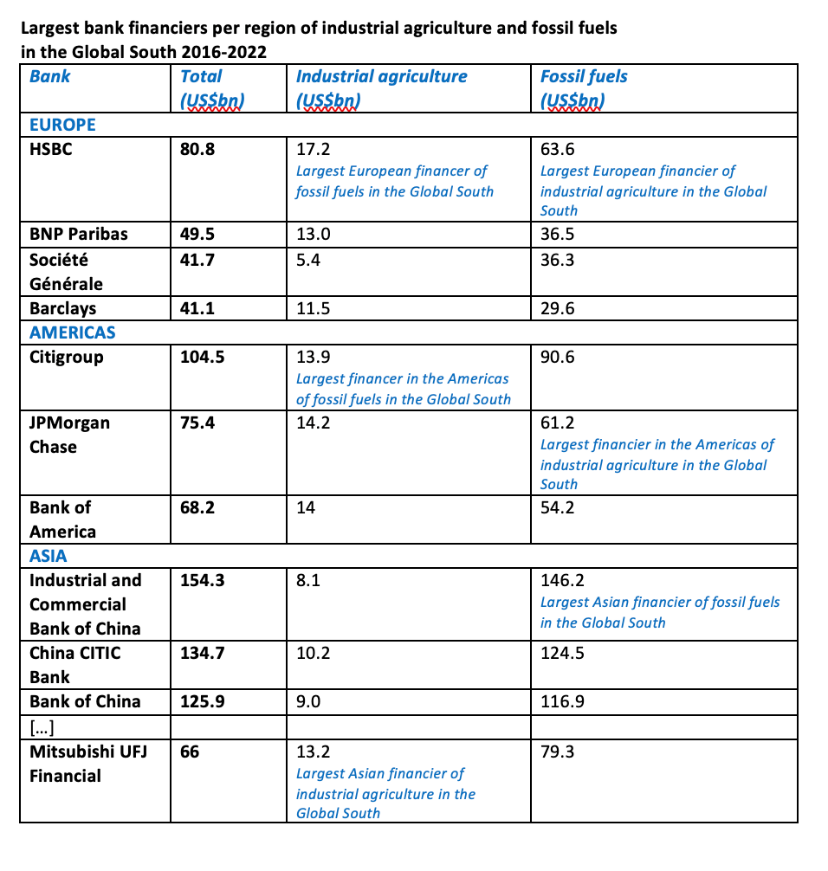
- Groundbreaking new report shows the fossil fuel and industrial agriculture industries in the Global South are receiving 20 times more financing from banks than governments are receiving for climate solutions.
- Banks have put $3.2 trillion towards the expansion of fossil fuels since the Paris Agreement, with $370 billion being funneled into the second major cause of climate change, industrial agriculture.
- Top banks funding the climate crisis include HSBC, Citigroup and JP Morgan Chase and in Australia, ANZ is leading the pack.
A new report reveals for the first time that the world’s banks including HSBC, Citigroup and Barclays are channeling an astounding 20 times more finance into the major causes of climate change than governments in the Global South are receiving as funding for climate solutions.
How the Finance Flows: the banks fuelling the climate crisis shows that bank financing provided to the fossil fuel industry in the Global South reached an estimated US$3.2 trillion in the seven years since the Paris Agreement on Climate Change was adopted, with US$370 billion provided to the largest industrial agriculture companies operating in the Global South.
This report comes at a time when new polling conducted by ActionAid showed that 3 in 5 Australians care if their bank invests in fossil fuel and industrial agriculture companies that contribute to climate change. With over half of Australians wanting banks to stop funding fossil fuel companies (56%), and almost half (46%) wanting banks to stop funding harmful industrial agriculture.
The ActionAid report found the top banks from each region funding fossils fuels and industrial agriculture in the Global South were:
- In Europe: HSBC, BNP Paribas, Societe Generale, Barclays.
- In the Americas: Citibank, JPMorgan Chase, Bank of America
- In Asia: Industrial and Commercial Bank of China, China CITIC Bank, Bank of China and Mitsubishi UFJ Financial
Michelle Higelin, Executive Director of ActionAid Australia, said: “It is deeply concerning that more money is flowing into funding climate destruction than climate solutions in countries facing high levels of poverty and severe climate impacts. The climate crisis is reversing progress in addressing gender inequality, poverty and hunger, and global banks are funding this crisis.”
“Australians want their banks to stop investing in climate wrecking industries that threaten the future of those on the frontlines of the climate crisis.”
Teresa Anderson, Global Lead on Climate Justice at ActionAid International and author of the report, said: “Global banks often make public declarations that they are addressing climate change, but the scale of their continued financing of fossil fuels and industrial agriculture is simply staggering. It is communities in Africa, Asia and Latin America who are suffering the impacts of decisions made in distant banking boardrooms. By financing fossil fuel and industrial agriculture in the Global South, banks are condemning communities to the cruel combination of landlessness, deforestation, water pollution and climate change. With this report, banks can no longer pretend that the issue is out of sight, out of mind.
Teresa added: “Banks need to own up to the harm that they are unleashing on the communities and the planet, and urgently stop financing the destruction wreaked by fossil fuels and industrial agriculture.”
Flora Vano, Country Manager of ActionAid Vanuatu: “The climate crisis is an existential threat to the lives and livelihoods of women in my community. We are facing climate disaster after climate disaster that are leaving us with little time to recover. There can be no more investment in new fossil fuels if my country is to have a future. To stay below 1.5 degrees, we need a phase out of fossil fuels not a phase down.”
“Women in Vanuatu are finding solutions and leading efforts to build their community's resilience to climate change, but without urgent global action to stop the financing of climate wrecking industries our efforts to protect our communities will not be enough. We cannot hold back the tide on climate destruction on our own.”
ActionAid's report sets out the alternatives to these harmful practices:
“Scaling up investing in women's leadership in solutions like renewable energy and agroecology is essential and this must be supported by public financing. There is a lot more the Australian Government could be doing to finance climate solution,” said Michelle Higelin.
The report calls for:
- Banks to immediately stop project and corporate financing for all new deforestation, coal and fossil fuel expansion activities, and rapidly phase out financing of all other fossil fuel and harmful industrial agriculture activities
- Banks must strengthen polices against human rights abuses and deforestation to protect the rights of communities most impacted by climate change.
- Governments, like Australia, should regulate the banking and finance sectors to stop the financing of fossil fuel expansion, and scale up support and planning for just transitions to real solutions such as renewable energy and agroecology.
ENDS
For more information and interviews with ActionAid spokespeople, please contact: Tim Brunero, 0405 285 547 / tim@hortonadvisory.com.au
Notes to Editors
The research was in partnership with independent research organisation Profundo.
For a summary table of the key results and funding of fossil fuels and industrial agriculture in the Global South, see below:
About ActionAid Australia
ActionAid is a global women’s rights organisation working in more than 45 countries across the world. ActionAid supports women living on the frontlines of the climate crisis to prepare and respond to the growing impacts in their communities. www.actionaid.org.au



